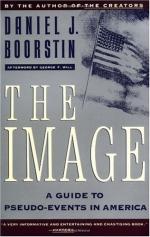
|
| Name: _________________________ | Period: ___________________ |
This test consists of 15 multiple choice questions and 5 short answer questions.
Multiple Choice Questions
1. When did Al Capone die?
(a) 1947.
(b) 1965.
(c) 1949.
(d) 1951.
2. Boorstin relates pre-packaged travel to what activity, in Chapter 3 - Section I?
(a) Watching a movie.
(b) Cooking dinner.
(c) Sleeping.
(d) Reading a book.
3. According to Walter Lippman, a ____ is a way of giving rapid meaning to an external person or situation to help one orient to a world full of confusing and overwhelming experiences.
(a) Propaganda.
(b) Pseudo-event.
(c) Stereotype.
(d) Archetype.
4. How many cars were registered in the United States in 1900?
(a) 20,000.
(b) 8,000.
(c) 30,000.
(d) 10,000.
5. What does Boorstin refer to pseudo-events as, in Chapter 1 - Section IV?
(a) Stereotypes.
(b) Ambiguous truths.
(c) Ambiguous falsehoods.
(d) Appealing falsehoods.
6. What book of Walter Lippman's does Boorstin cite, in Chapter 1 - Section V?
(a) The Origins of Family.
(b) Sociological Justices.
(c) Mein Kampf.
(d) Public Opinion.
7. Boorstin suggests, in Chapter 1 - Section V, that the advances made in American society have served to "blur the edges of" what?
(a) Truth.
(b) Reality.
(c) Commercialism.
(d) Commerce.
8. What refers to a person or thing that draws, allures, or entices?
(a) Cultivation.
(b) Seductress.
(c) Fortress.
(d) Attraction.
9. In Chapter 1 - Section IV, Boorstin uses an example from the 1950s in which a story was released about an imminent attack by whom?
(a) Russia.
(b) China.
(c) Iran.
(d) Iraq.
10. Who opened the first motel as a new form of accommodation in Memphis, Tennessee in 1952?
(a) William Berkshire.
(b) James Anderson.
(c) Conrad Hilton.
(d) Kemmons Wilson.
11. How many people were aboard Thomas Cook's first train tour to Scotland?
(a) 200.
(b) 350.
(c) 100.
(d) 250.
12. What was the familiar hallmark of Baedeker guides?
(a) Red binding.
(b) Yellow binding.
(c) Green binding.
(d) Blue binding.
13. What is the first of the "extravagant expectations" held by Americans, according to Boorstin?
(a) There is always more that the world can provide.
(b) Time is of the essence.
(c) We have unlimited power to fashion the world to our desires
(d) Money can buy anything.
14. When was Mein Kampf published?
(a) 1932.
(b) 1900.
(c) 1925.
(d) 1945.
15. In Chapter 1 - Section V, Boorstin discusses a change in the way people relate to truth and to what?
(a) Media.
(b) Religion.
(c) Ambiguity.
(d) Image.
Short Answer Questions
1. What was the name of the plane that Charles Lindbergh made his flight across the Atlantic in?
2. What name referred to Stalin's campaign to purge the Communist Party of people accused of sabotage, terrorism, or treachery?
3. What term does Boorstin assert has been relegated to the experiences of young children or naïve adults?
4. Who did Charles Lindbergh marry?
5. Established by Boorstin, what is the first way pseudo-events can overshadow real or spontaneous events?
|
This section contains 437 words (approx. 2 pages at 300 words per page) |

|




